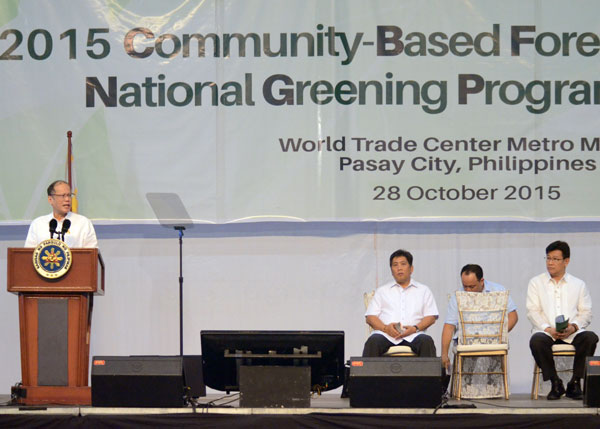News
Malacañang backing boosts PHL environmental performance – DENR

President Aquino cites the contribution of some 1,880 peoples’ organizations in various community-based forest management (CBFM) project sites nationwide in protecting and managing the country’s forest resources through the National Greening Program (NGP) during the CBFM-NGP Congress.
(Photo from DENR’s website)
MANILA – President Benigno S. Aquino III has lifted the Philippines’ environmental performance to a new level, enabling the country to better journey towards sustainable development.
Department of Environment and Natural Resources (DENR) Secretary Ramon Paje made such assessment and cited the Aquino administration’s policy and funding support as instrumental in bolstering government’s nationwide environmental protection and conservation bid.
“We have a President who’s very supportive of the environment,” Paje said at a press conference in Metro Manila on Friday.
Paje noted such presidential support helped DENR carry out since 2010 difficult but necessary environmental initiatives like the nationwide logging ban and science-based mass reforestation “which were previously in the back burner” so the agency can better protect and conserve natural resources while helping promote economic growth.
“I think we were able to somehow maintain balance – which is key to sustainable development – instead of being either too pro-environment or too pro-industry,” he said.
According to experts, sustainable development is development that meets present-day needs – including food from natural resources – without compromising future generations’ ability to meet their respective needs.
Paje considers President Aquino’s issuance of Executive Order No. 23, Series of 2011, a bold move as this instituted a moratorium on cutting and harvesting of timber in the country’s natural and residual forests to help avoid further forest cover loss.
“We were able to implement a logging ban in the entire Philippines,” Paje said.
EO 23 also created the multi-agency anti-illegal logging task force which includes DENR.
“The number of illegal logging hotspots nationwide is down to 23 areas from 197 areas,” noted Paje while reassuring sustained efforts to eradicate illegal logging in the country.
President Aquino complemented EO 23 by issuing in 2011 EO 26 which established the DENR-led National Greening Program (NGP) so government can fast-track reforesting open, denuded and degraded areas nationwide.
NGP targets exceeding government’s reforestation in the past 50 years by greening from 2011 to 2016 some 1.5 million hectares of land using an estimated 1.5 billion seedlings of various tree species.
Critics earlier branded NGP as an impossible mission.
Data Paje presented during the press conference show areas reforested under NGP already reached 1.35 million hectares by Dec. 31, last year, exceeding this program’s 2015 target of 1.2 million hectares.
He said NGP, the logging ban and crackdown on illegal logging are helping the country regain its forests.
Such forest area gain reaped international recognition and was cited as the fifth highest in the Global Forest Resources Assessment 2015 report, he noted.
“Our annual forest area gain is about 240,000 hectares,” he said.
For 2016, Paje said DENR’s budget is around PhP21.
8 billion. He noted some PhP500 million of the budget will be for rehabilitating the country’s coral reefs.
“A significant part of our reefs are destroyed already,” he said.
He also said bleaching that’s deadly to corals is an increasing occurrence in Philippine reefs due to warming sea water temperature.
“We must save our corals as these are essential in fishery production,” he said.
Government also budgeted another PhP500 million for solid waste management which local government units (LGUs) must spearhead implementing, Paje added.
“Hopefully, such funding support will make a dent in implementing R.A. 9003 (Ecological Solid Waste Management Act),” he said.
At the press conference, Paje likewise reported advancements in DENR’s anti-pollution campaign, cadastral survey, biodiversity protection and geohazard mapping last year.
Levels of air-polluting total suspended particulates andparticulate matter 10 (PM10) declined by 29 percent and 31 percent from 2010 and 2011 levels, respectively, he said.
A total 569 Adopt-an-Estero agreements between DENR and its partners cover the latter’s voluntary clean up of 346 ‘esteros’ and other water bodies nationwide, he noted.
“We consider Adopt-an-Estero as a very successful program since water bodies are being cleaned up at almost no cost to government,” he said.
Paje said DENR likewise finished government’s century-long cadastral survey program.
“We already completed cadastral survey of the country’s 1,634 cities and municipalities,” he said.
Latest data show some 474 kilometers of protected area boundaries have been delineated and demarcated on the ground as of November 2015 to guard against encroachment and other human activities that can destroy biodiversity there, Paje said further.
DENR saw increase in population of the Philippine eagle, tamaraw and pawikan, he also reported.
Paje noted DENR already completed at scale 1:10,000 meters geohazard mapping of the country’s 1,634 cities and municipalities aside from producing and distributing 60 three-dimensional map sheets.
He added the agency further undertook ecosystems research and development activities last year.





















